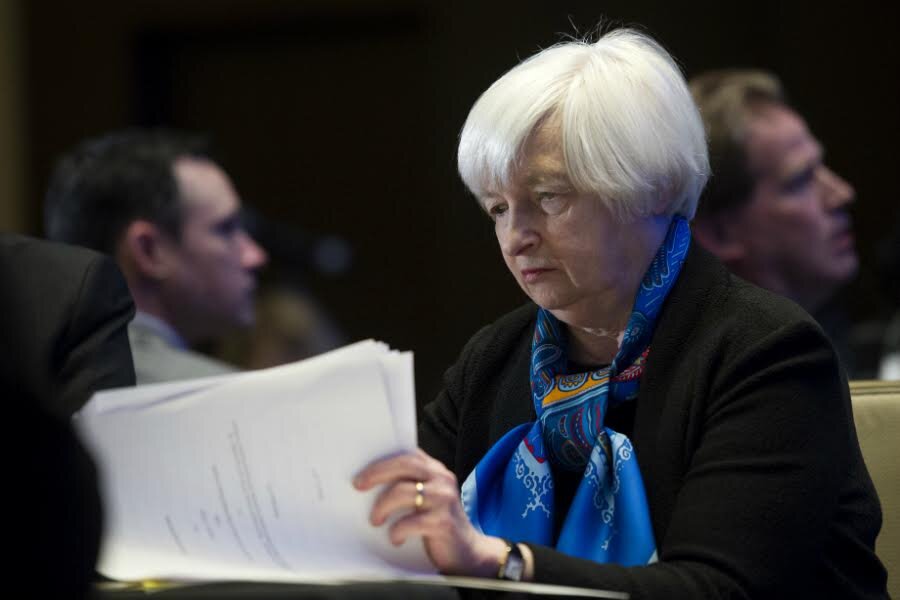Yellen to Congress: interest rates will continue to rise
Loading...
| Washington
Federal Reserve Chair Janet Yellen told Congress on Wednesday that the central bank expects to keep raising a key interest rate at a gradual pace and also plans to start trimming its massive bond holdings this year.
In her semiannual testimony on the economy, Ms. Yellen took note of a number of encouraging factors, including strong job gains and rising household wealth that she said should fuel economic growth over the next two years.
She blamed a recent slowdown in inflation on temporary factors. But she says Fed officials are watching developments closely to make sure that annual price gains move back toward the Fed's 2 percent target.
Many economists believe the Fed, which has raised rates three times since December, will hike rates one more time this year.
In her prepared testimony before the House Financial Services Committee, Yellen repeated the message she has been sending all year: The economy has improved enough that it no longer needs the extraordinary support the central bank began providing in 2008 in the wake of a severe financial crisis and the deepest recession since the 1930s. She noted that since the depths of the recession, unemployment is now down to 4.4 percent, near a 16-year low. And while the economy started the year with a sluggish growth rate of just 1.4 percent, it has regained momentum in recent months, helped by strong job gains, a revival of business investment, and a strengthening of overseas economies.
But Yellen cautioned that "considerable uncertainty always attends the economic outlook." Those include whether inflation will indeed pick up, as well as questions about how much of President Trump's economic program will make it through Congress. She noted that while the global economy appears stronger, "a number of our trading partners continue to confront economic challenges."
"At present, I see roughly equal odds that the US economy's performance will be somewhat stronger or somewhat less strong than we currently project," she said.
Yellen made no reference in her prepared remarks to what many investors see as one of the biggest unknowns at the moment: whether Trump will ask Yellen to remain as Fed leader when her current term ends next February. Yellen so far has deflected questions about whether she would accept a second four-term term as chairman if Trump asked her to remain.
She also did not mention the potential impact of Trump's other Fed nominations on central bank interest rate decisions and its approach to its other job, regulating the nation's largest banks.
During last year's presidential campaign, Trump was critical of the central bank for its low-rate policies, which he said were helping Democrats, and for its efforts to enact tougher regulations on banks in response to the 2008 financial crisis.
On Monday, the administration announced that it had chosen Randal Quarles, a Treasury Department official under two Republican presidents, to serve as vice chairman for supervision, the Fed's top bank regulatory post.
Including the post Quarles would fill, the Fed has three vacancies on the seven-member board. All of Trump's nominations will require Senate approval.The Fed slashed its key policy rate to a record low near zero in December 2008 to combat the worst economic downturn since the 1930s – and kept it there for seven years until nudging it up modestly in December 2015. It then left the rate unchanged for another year until raising it again in December of last year, followed by increases in March and June this year. Even so, the rate remains in a still-low range between 1 percent and 1.25 percent.
At its June meeting, the Fed signaled that it expected to begin shrinking its $4.5 trillion balance sheet later this year, a step that could put gradual upward pressure on longer-term rates for such items as home mortgages.
In her testimony Wednesday, Yellen repeated the Fed's plans to increase the level of bonds that will be sold off each month at a gradual rate to give markets time to adjust. At its June meeting, the Fed announced that it planned to begin reducing its holdings by $10 billion per month.
The Fed's holdings have surged five-fold since 2008, ballooning in size as the Fed bought Treasury and mortgage bonds. By taking the bonds off the market, the Fed helped to encourage lower long-term interest rates that made it less expensive for consumers and businesses to borrow. One of the goals of gradually unwinding the balance sheet would be to not disrupt broader economic growth despite the possibility of rising long-term rates.
The Fed intends to continue to manage interest rates through its primary policy tool, the federal funds rate. But it would be prepared to resume bond purchases "if a material deterioration in the economic outlook" were to occur, she said.







